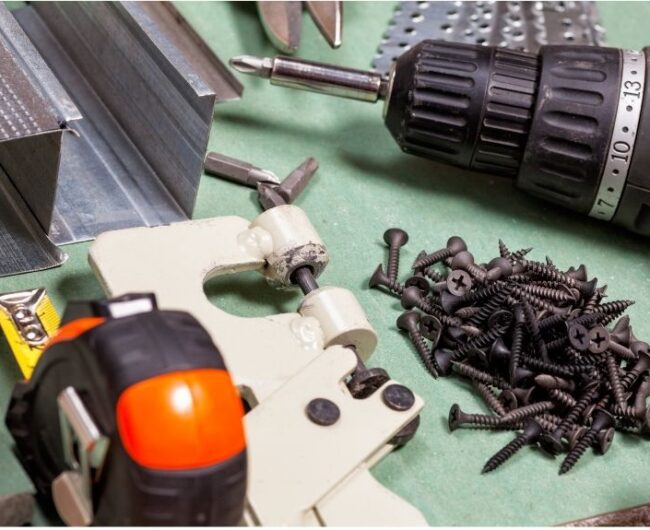
Best Insurance for Drywall Contractors
Find the best insurance for Drywall Contractors…
Why should Drywall Contractors choose a package of coverages to protect their business?
As a drywall installer, you’re surrounded by employees, contractors, and clients while taping and finishing in other people’s buildings and homes.
Easy Article Navigation
- Commercial General Liability
- Workers’ Compensation Insurance
- Tools & Equipment Coverage
- Commercial Auto Insurance
- Here’s What We Recommend
This opens you up to many risks, including injuries and theft. Drywall contractor insurance can help cover lawsuits and other costly losses.
Protect your business like you would protect your own body. Policies that cover the risk of injury, theft, liability, and more can be more than worth it.
General Liability
Since most states require a license to operate a drywall contracting business with their borders, a drywall contractor typically has to show proof of a surety bond, workers’ compensation, and in many cases, general liability insurance.
A general liability (GL) policy will serve as the foundation of a well-formed insurance package because of the risk mitigation it provides:
- Bodily Injury Liability – This coverage protects you and your business if a third party is injured as a result of your contracting business and
- Property Damage Liability – Drywall contractors can be held liable for property damage they unintentionally cause at a job site. For example, if a sheet of drywall falls before being secured into the ceiling and damages a custom-built dining room table, you could be on the hook for the cost of that accident. Rather than having to pay out of the company’s funds, your insurer would pay to repair or replace an expensive custom-built dining table.
- Products-Completed Operations – Not every claim happens while you’re on the job. In fact, most product-completed operation claims are filed weeks, months, or even years after a job has been completed. This coverage protects you if a product or service you installed causes bodily injury or property damage to a third party after you and your crew are packed up and gone.
- Personal Injury – With personal injury coverage you are protected if you or an employee cause financial injury to a customer or third party by slander, defamation, or copyright infringement. If this is the case, your insurance company will pay defense costs and cover a judgment awarded by the court up to the limits of your coverage.
What General Liability Does Not Cover
Generally, if a claim is made against you or your company for damages that would ordinarily be covered by another policy, your GL policy will exclude that coverage. This applies to risks such as:
- Professional Errors
- Employee discrimination or wrongful termination
- Employee or non-insured subcontractor work-related injuries
- Vehicles used in your business
- Liquor Liability claims
Workers’ Compensation Insurance

Virtually every contractor is introduced to workers’ comp insurance early on in their career. In fact, if you check our STATES tab on our website, you can click on your state to find out which coverage or bond you’ll need to get licensed to operate in that state.
For example, if you click on Nevada, you’ll be taken to the Nevada Contractors Insurance page where you will find the insurance and bond requirements that are required to operate in that state.
In almost every state in the country, the licensing board is going to require proof of a licensing bond and a workers’ compensation policy with the state-mandated limits.
Your workers’ compensation policy will provide the protection you need if an employee suffers a work-related injury or illness.
Without a workers’ compensation policy in place, your business will have to pick up the costs for medical bills resulting from the injury or illness, lost wages, and even more expenses if your employee dies as a result of his or her injury or illness.
Additionally, your state’s labor is going to charge you some hefty fines for failing to protect your employees. Don’t take that risk! It can take only one serious claim to bankrupt your company.
Tools and Equipment Coverage (Inland Marine)

Believe it or not, many new and experienced contractors assume that their tools and equipment are covered under their commercial auto policy or general liability. This is not the case. The inland marine policy (one of the oldest coverages available) is designed to repair or replace your tools and equipment if they are stolen or damaged due to a covered peril.
Your tools and equipment are covered in storage, in transit, and at the job site. This means that if a tool goes missing or is damaged in transit or at the job site, you’ll not have to dig into the company’s bank account to repair or replace expensive tools that you’ll likely use every day.
Commercial Auto Insurance
Unfortunately, many small drywall businesses work from a single-vehicle they’ve insured under a personal auto policy because the vehicle is in their name. There are two very costly mistakes when you insure a work vehicle under a personal auto policy:
- Most personal auto policies exclude coverage on vehicles used for business, and
- Most personal auto policies do not offer $1million or $2 million limits of liability
Even if your personal auto agent agrees to cover your work vehicle, ask them if they offer $1milliion single limits on each vehicle you own.
Additionally. personal auto policies limit the number of units to 4, but with a commercial auto policy, there are no limits on the number of vehicles insured and no limit to the number of drivers listed on the policy.
Moreover, if you win a bid with a large commercial or government project, your customer will likely require that you carry $2 to $5 million in liability limits. If this happens, you can easily purchase a commercial umbrella policy to add additional liability limits to your commercial auto policy and your general liability policy.
Where to Get the Best Rates on Commerical Insurance for Drywall Contractors
Right now, the competition in the commercial insurance marketplace is very intense which means you can find the most competitive rates quickly and easily.
Rather than contacting individual insurance companies, you’ll save time and money contacting a national independent insurance broker like Fairbanks Insurance Brokers.
Fairbanks employs industry experts who are uniquely aware of the risks involved in your industry and can help you mitigate these risks without breaking the bank.
Here is What We Recommend
General Liability: Contractors General Liability will be the foundation of protection for your business. The coverage will respond if you or your employees are found liable for bodily injury, property damage, or have a products/completed operations complaint. The coverage also covers defense costs for your business to respond to any lawsuits brought by a third party.
Workers’ Comp: Many states will require contractors to provide workers’ compensation coverage for their workers before they can begin a project. Accidents will happen at the job site that can result in an employee becoming injured and missing work. Your workers’ compensation coverage will provide financial assistance for medical expenses and lost wages.
Surety Bonds: Your state will likely require you to be licensed before you can begin operations. Most states and customers will require contractors to offer a license or surety bond before you are allowed to bid on a job or begin working.
Commercial Auto: Typically, most contractors will have light and heavy vehicles that require commercial auto insurance to make certain their vehicles can be repaired or replaced in the event of an accident, vandalism, or theft.
Tool Coverage: Also known as Inland Marine Insurance, this policy will provide for reimbursement for expenses to repair or replace tools and equipment. Your tools represent an important part of your livelihood, so we always encourage carpentry contractors to consider this valuable coverage.
Get A Quote

